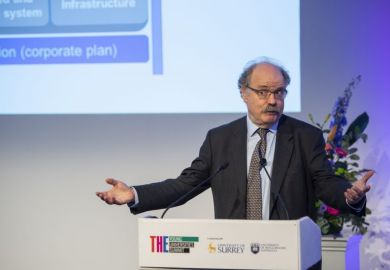Academics have expressed concern about plans announced by the UK’s Conservative government to create a new funding agency modelled on the US research organisation that created the forerunner to the internet.
Plans to create a UK equivalent of the US’ Defense Advanced Research Projects Agency and cut down on research funding “bureaucracy” are longstanding priorities for Dominic Cummings, the most senior adviser to Prime Minister Boris Johnson. But their inclusion in the Queen’s Speech on 14 October raised concerns about whether he would bypass existing funding mechanisms or reshape the entire research system to reflect his own agenda on science.
Mr Cummings’ blog, written in his years outside government, spelled out his belief that the government should offer far greater support to research that could lead to technological breakthroughs.
The briefing document for the Queen’s Speech says that the government would combine “increased investment in science” with “a new approach to funding emerging fields of research and technology”, which would be “broadly modelled” on Darpa. The government also wants to “[reduce] bureaucracy in research funding to ensure our brilliant scientists are able to spend as much time as possible creating new ideas, not filling in unnecessary forms”, the document says.
The US government created the Advanced Research Projects Agency in 1958. It was subsequently renamed Darpa to reflect a focus on defence-related technology.
In 2014, Mr Cummings advocated the creation of a “civilian version of Darpa aimed at high-risk/high-impact breakthroughs in areas like energy science and other fundamental areas such as quantum information and computing that clearly have world-changing potential”.
Kieron Flanagan, senior lecturer in science and technology policy at the University of Manchester, said that the proposals reflected suggestions that Mr Cummings felt that the creation of UK Research and Innovation – an umbrella body for the country’s research councils – “was a failure, at least in terms of playing the role of supporting emerging technologies”.
But, while Darpa had played an important role in shaping the US IT industry in the 1960s and 1970s, there was “no reason to suppose what worked for one specific industry at a specific moment in history is transferrable to emerging technologies in general”, Dr Flanagan said.
“The creation of a new agency could help bring back some of the diversity lost in the creation of UKRI,” Dr Flanagan said. “[But] this notional benefit has to be set against the opportunity costs and risks of policymakers and the research and innovation communities getting bogged down in the creation of new processes and institutions.”
James Wilsdon, professor of research policy at the University of Sheffield, said it was unclear whether the new Darpa-style agency would “sit within the UKRI umbrella or outside it”.
“I hope the science and research community won’t allow its enthusiasm for extra investment to buy its silence in asking tough questions about the evidence, justification and accountability of this ‘new approach’,” Professor Wilsdon said. “What the UK research and innovation system needs is a period of stable growth with multiple funding streams – not dilettante tinkering by unelected advisers.”
Times Higher Education reported last week that Chris Skidmore, the universities minister, wants to combine increased funding with the creation of a five-year financial framework programme to fund research. Whether Mr Skidmore’s vision meshes with that of Mr Cummings remains to be seen.
POSTSCRIPT:
Print headline: Concern over UK Darpa plan
Register to continue
Why register?
- Registration is free and only takes a moment
- Once registered, you can read 3 articles a month
- Sign up for our newsletter
Subscribe
Or subscribe for unlimited access to:
- Unlimited access to news, views, insights & reviews
- Digital editions
- Digital access to THE’s university and college rankings analysis
Already registered or a current subscriber?








